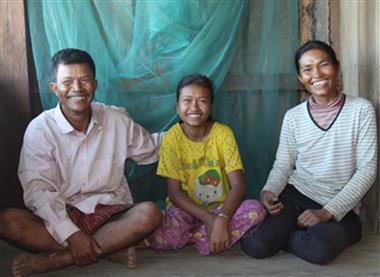While Cambodia has stepped up its malaria control efforts, ITNs mostly have been distributed through health centers or during community campaigns – channels that often miss migrant workers.

Migrant workers with ITNs that were distributed to them while working at a rubber plantation in Battambang Province, Cambodia. Source: CAP-Malaria
Since its emergence in the 1950s, drug-resistant malaria has been a serious problem in western Cambodia. The development of rubber plantations and large farms have exacerbated the issue by attracting migrant laborers who are more likely to contract malaria since they have low immunity to malaria and little knowledge of prevention. They are less likely to seek treatment and are often unfamiliar with government-run malaria treatment sites. They can carry the parasites back to their families and homes, perpetuating the cycle of malaria transmission. Mrs. Si Dara, a farm owner in Battambang Province, explains, “In late 2011 until early 2012, on average, 10 of my workers got malaria each month … I knew that they had malaria, but I didn’t know how malaria occurred.”
While Cambodia has stepped up its malaria control efforts, ITNs mostly have been distributed through health centers or during community campaigns – channels that often miss migrant workers. To increase access, PMI specifically targets their occupational settings, providing nets free of charge to farm owners, who distribute them to migrant workers. PMI-supported staff also educate farm owners and workers. In FY 2013, this model operated in 319 villages in 9 operational districts, distributing 97,955 ITNs to 8,741 farm owners and long-term mobile families.
Feedback from community leaders and farm owners has been positive. Mrs. Dara has noticed a significant decline in the number of malaria cases from mid- to end 2012, down to about one case per month. Innovative and creative solutions making ITNs accessible are needed to ensure that all who are at risk for malaria are protected.
